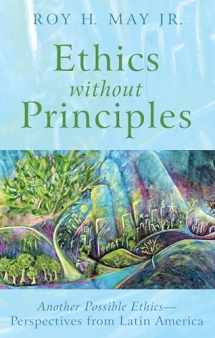
Ethics without Principles: Another Possible Ethics-Perspectives from Latin America
ISBN-13:
9781498225250
ISBN-10:
149822525X
Author:
Roy H. May Jr.
Publication date:
2015
Publisher:
Pickwick Publications
Format:
Paperback
98 pages
FREE US shipping
Book details
ISBN-13:
9781498225250
ISBN-10:
149822525X
Author:
Roy H. May Jr.
Publication date:
2015
Publisher:
Pickwick Publications
Format:
Paperback
98 pages
Summary
Ethics without Principles: Another Possible Ethics-Perspectives from Latin America (ISBN-13: 9781498225250 and ISBN-10: 149822525X), written by authors
Roy H. May Jr., was published by Pickwick Publications in 2015.
With an overall rating of 4.0 stars, it's a notable title among other
books. You can easily purchase or rent Ethics without Principles: Another Possible Ethics-Perspectives from Latin America (Paperback) from BooksRun,
along with many other new and used
books
and textbooks.
And, if you're looking to sell your copy, our current buyback offer is $0.43.
Description
Ethics in the West too often equates morality with universal moral principles, thus imposing lifestyles and moral criteria that do not respect differences and local histories. Even Christianity proposes ethics that is based on eternal, absolute and universal truths or principles, independent of sociocultural and historical contexts. The problem is that these universal moral laws become a means of social control to exclude those who are different: non-Christian religions, nonwhite races, non-Western cultures, and poor and marginalized social classes everywhere. To these can be added minorities marginalized because of sexual orientation, physical handicaps, and women of all sectors and cultures. Another kind of ethics is urgent. For these reasons, Christians in Latin America and other parts are seeking innovative ways of envisioning ethics from their marginalized and discriminated social locations in order to find another possible ethics, an ethics that is not universal and not based on eternal truths or principles, but rather is contextual and historical and that takes into account real-life realities. Only an ethics that does this will be liberative. Important steps toward this other possible ethics have been taken by the theology of liberation by developing a contextual and intercultural morality.


We would LOVE it if you could help us and other readers by reviewing the book
Book review

Congratulations! We have received your book review.
{user}
{createdAt}
by {truncated_author}


